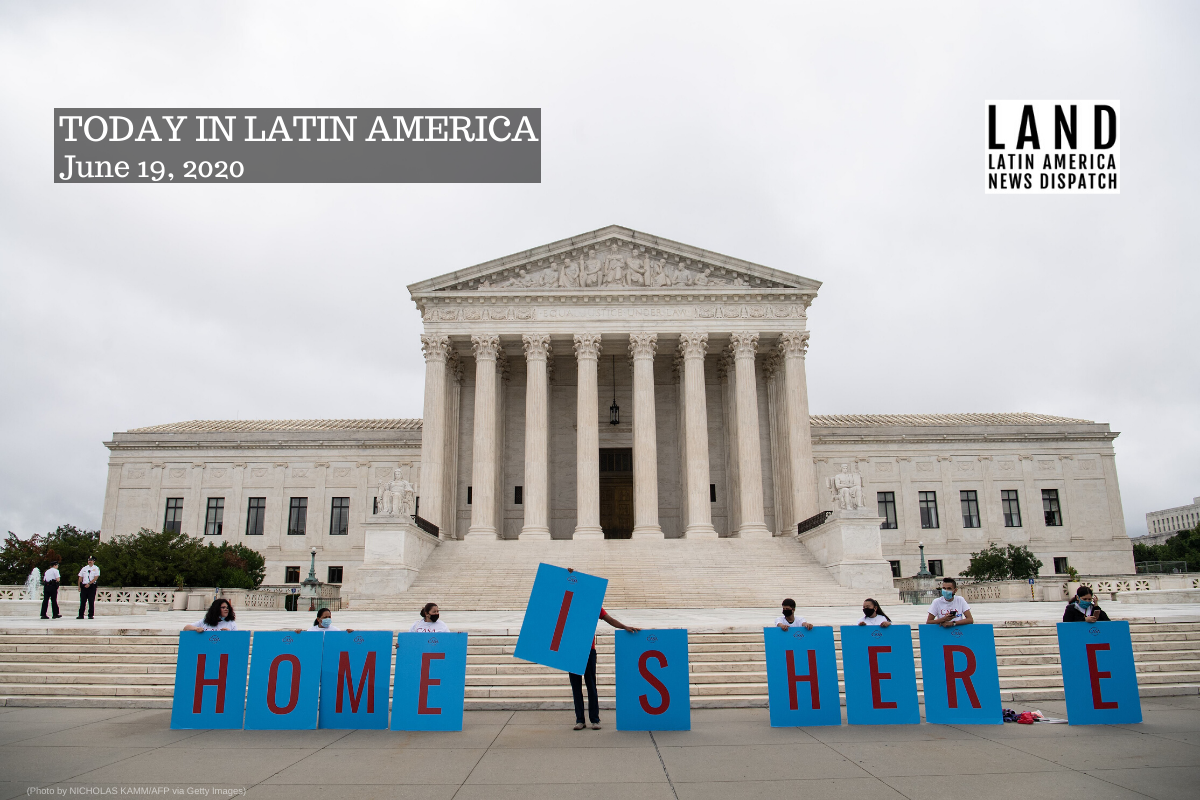

(Photo by NICHOLAS KAMM/AFP via Getty Images)
UNITED STATES: In a historic 5-4 ruling, the Supreme Court declared that the Trump administration cannot end the Deferred Action for Childhood Arrivals Program, known as DACA. The program allows for children of migrants who arrived to the United States at 16 years old or younger to obtain permanent residency and apply for work permits so long as they pursue higher education or enlist in the armed forces. The measure affects more than 700,000 DACA recipients, also known as DREAMers, the majority of whom migrated with their families from Latin American countries.
President Trump rescinded the program and attempted to phase it out in 2017, leaving DACA recipients in a state of uncertainty for nearly three years. Activist groups have continuously advocated against the administration’s decision, and view the ruling on DACA as a win. The organization United We Dream held a LIVE social media event to reflect on what this moment means.
EN VIVO: Estamos teniendo una conversación para nuestra comunidad indocumentada acerca de lo que la decision de la Corte Suprema acerca de DACA significa para nosotros en este momento.
https://t.co/HjZM6b1kMd— United We Dream (@UNITEDWEDREAM) June 19, 2020
While it is unclear whether or not the program will allow for new applicants, many Dreamers are now able to continue pursuing essential careers without fear of deportation. Fifty thousand DACA recipients are in health-related fields, and many are currently working the frontlines to combat COVID-19.
HEADLINES FROM THE WESTERN HEMISPHERE
SOUTHERN CONE
BRAZIL: For the third day in a row, Brazil had an increase of more than 1,200 cases of COVID-19. The country’s case load trails only the United States. Brazil now has more than 980,000 coronavirus cases, with the highest total in the state of São Paulo. Indigenous populations have also been affected by the virus, experiencing a mortality rate twice as high as the rest of Brazil’s population. President Jair Bolsonaro is also currently facing a corruption inquiry from Brazil’s Supreme Court, with ex-aides being arrested and the Minister of Education resigning over the increasing tensions.
CHILE: Earlier this week, Chilean officials announced that national lockdown restrictions will be increased amidst a spike in COVID-19 cases. The restrictions include an intense increase in policing, with curfew violations being punishable by up to five years in prison. The current number of cases in the country is more than 220,000, with a counting error of 31,000 cases leading to the unexpected increase. The health minister also recently resigned over the administration’s mishandling of the coronavirus.
THE ANDES
BOLIVIA: Tensions between former President Evo Morales and interim President Jeanine Áñez are rising after the politicians argued on Twitter. Áñez said the Movement for Socialism (MAS) party is attacking her government with “terrorist tactics,” while Morales denounced Áñez’s administration for “lying to Bolivians.” Áñez’s administration and MAS have been at odds with one another while attempting to pass a COVID-19 Relief Act with a fund of more than $120 million. The parties have also heatedly debated when the presidential election will occur. It is now set for September 6, nearly a year after the controversial elections were initially held.
PERU: Shopping centers will begin reopening Monday, with many locations updating safety protocols to follow social distancing rules. Stores are expected to limit their capacity to 50%. Customers will also be required to wear masks at all times and wash their hands before entering the building. Peru is currently facing economic problems due to the virus, with many healthcare workers lacking personal protective equipment and some patients resorting to the black market to buy ventilators at extremely high prices.
THE CARIBBEAN
CUBA: After nearly three months of national quarantine, Cuba is beginning to loosen its lockdown restrictions. The Cuban government plans on first reopening public transportation systems, then popular tourist destinations such as beaches. Crowds will be limited to a certain capacity, and people will be required to wear face masks and follow social distancing rules. The island currently has 2,295 cases of Covid-19, and 85 deaths. More than 88% of coronavirus patients have recovered.
PUERTO RICO: Governor Wanda Vázquez gave her first State of the Union address yesterday, which was deemed unconstitutional by several legislators. In addition, Vázquez introduced a budget that is not yet approved by the Fiscal Control Board. This is the first State of the Union address given by a governor who was not elected into government by Puerto Ricans. Members of the Popular Democratic Party filed an official complaint against Vázquez for holding the speech before gaining approval from both branches of the legislature.
CENTRAL AMERICA
EL SALVADOR: Yet another period of heavy rain is expected to increase the risk of landslides and other natural disasters in the country. More than 330,000 people affected by Tropical Storm Amanda will now face more harsh weather. Dozens of families living in homes at risk of collapse due to the storm were temporarily relocated to educational centers. Cities and municipalities such as San Salvador are continuing recovery efforts from the storm, with the Ministry of Agriculture and Livestock working to feed more than 13,000 families in need.


